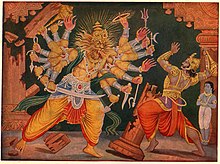After Hiranyakashipu's younger Brother Hiranyaksha's death at the hands of the Varaha avatar of Vishnu, Hiranyakashipu comes to hate Vishnu. He decides to kill him by gaining mystical powers, which he believes Brahma, the chief among the devas, will award to him if he undergoes many years of great austerity and penance, just as Brahma awarded powers to other Rakshasas.
This initially seemed to work as planned, with Brahma becoming pleased by Hiranyakashipu's austerities.[4] Brahma appears before Hiranyakashipu and offers him a boon of his choice. But when Hiranyakashipu asks for immortality, Brahma refuses. Hiranyakashipu then makes the following request:
In other Puranas, many variations of the boon are given. The Shiva Purana mentions that Hiranyakashipu asked Brahma that he would be invulnerable to dry or wet weapons, thunderbolts, mountains, trees, missiles or any form of weapon. The Vayu Purana mentions that Hiranyakashipu asked to be so powerful, only Vishnu would slay him. Other variations include not being slain by any living being, not at daytime or nighttime and not above or below.
In section 14, the Anusasana Parva of the Mahabharata, the Sage Upamanyu briefly mentioned to Krishna that Hiranyakashipu also performed another penance to please Lord Shiva. Shiva granted Hiranyakashipu the boon that he would have unrivalled combat prowess, exceeding skill in the use of bow and other weapons as well as the powers of all the gods, including Indra, Yama, Kubera, Sūrya, Agni, Vayu, Soma and Varuna.
In consequence of these two boons, Hiranyakashipu become so mighty that he was able to shake the very Himalayas down to their roots. Ravana once tried to lift Hiranyakashipu's earrings but he was unable to do so because they were very heavy.
The Brahmanda Purana mentions that Hiranyakashipu ruled for 107,280,000 years.
Whilst Hiranyakashipu is performing the penance to be granted this boon, Indra and the other devas attack his home,[6] seizing the opportunity in his absence. At this point the divine sage Narada intervenes to protect Hiranyakashipu's wife Kayadhu,[7] whom he describes as 'sinless'.[8] Narada takes Kayadhu into his care, and while she is under his guidance, her unborn child (Hiranyakashipu's son) Prahlada becomes affected by the transcendental instructions of the sage even in the womb. Later, growing as a child, Prahlada begins to show symptoms of Narada's prenatal training and gradually becomes recognised as a devoted follower of Vishnu, much to his father's disappointment.[9]
Hiranyakashipu eventually becomes so angry and upset at his son's devotion to Vishnu (whom he sees as his mortal enemy) that he decides he must kill him[10] but each time he attempts to kill the boy, Prahlada is protected by Vishnu's mystical power. When asked, Prahlada refuses to acknowledge his father as the supreme lord of the universe and claims that Vishnu is all-pervading and omnipresent. To which Hiranyakashipu points to a nearby pillar and asks if 'his Vishnu' is in it:
Prahlada then answers, He was, He is and He will be. (In an alternate version of the story, Prahlada answers He is in pillars, and he is in the least twig.) Hiranyakashipu, unable to control his anger, smashes the pillar with his mace. A tumultuous sound is heard, and Vishnu in the form of Narasimha appears from the broken pillar and moves to attack Hiranyakashipu in defence of Prahlada.
Vishnu has chosen here to appear in the form of Narasimha in order to be able to kill Hiranyakashipu without violating the boon given by Brahma. Hiranyakashipu cannot be killed by human, deva or animal, but Narasimha is none of these, as he is a form of Vishnu (a deva) incarnate as part human, part animal. He comes upon Hiranyakashipu at twilight (when it is neither day nor night) on the threshold of a courtyard (neither indoors nor out), and puts the demon on his thighs (neither earth nor space). Using his nails (neither animate nor inanimate) as weapons, he disembowels and kills the demon.[12]
Even after Hiranyakashipu's death, none of the gods and demigods present are able to calm Narasimha's fury, not even Shiva. So all the gods and goddesses call His consort, the goddess Lakshmi, but she is also unable to do so. Then, at the request of Brahma, Prahlada is presented to Narasimha, who is finally calmed by the prayers of his devotee.[13]

